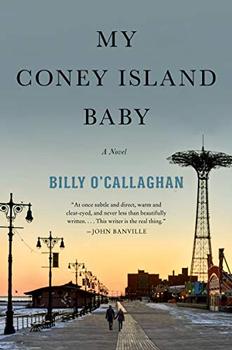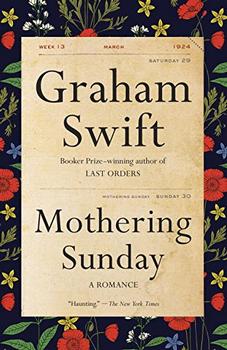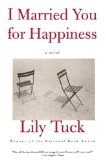Summary | Excerpt | Reviews | Beyond the book | Read-Alikes | Genres & Themes | Author Bio

Critics' Opinion:
Readers' Opinion:
First Published:
Apr 2019, 256 pages
Paperback:
Apr 2020, 256 pages
 Book Reviewed by:
Book Reviewed by:
Rory L. Aronsky
Buy This Book
Come to Coney Island, Brooklyn! The contemporary story Billy O'Callaghan presents in My Coney Island Baby, about Michael and Caitlin, is worth the visit.
This is O'Callaghan's second time writing a novel in the place famous for its amusement parks, boardwalk, and bad food. He took a few turns writing short stories, but he clearly enjoys having so much room again. "Frothing, needlepoint flecks mottle a surface as dull as lead, great furred bilges of surf break hard against the shoreline." He writes steadfast descriptions of the natural world bearing down hard on the two lovers on this particular harsh day. And it's not only nature that gets this treatment, Michael and Caitlin's emotional lives get it as well, which, in turn, taps into our emotional lives, making this novel not just a read, but an experience too – because O'Callaghan's text basically says: "Follow me softly. I will also tell you the story of your life here."
Michael and Caitlin have been having a monthly affair for 25 years, and it may be finally reaching its end. In the midst of observing Michael attempting to keep the conversation neutral while he and Caitlin are still outside in that awful wintry weather, O'Callaghan gets right to the heart of the matter: "In your forties your sense of longing shifts, and pleases itself in comfort rather than thrills…And even on a noon so crushed by wind as this, being out here is still worth anything for the way in which it indulges their particular strain of make-believe." Caitlin "no longer questions her feelings. If she feels likes smiling, she smiles. You learn to make the best of any situation, or else there is only death." This is emotional writing at its best.
At various intervals, we learn the stories of who Michael and Caitlin are, where they come from, and the lives they live when they're not with each other. Michael is married to Barbara, a marriage that is cracked in so many places by the death of their infant son. They spent agonizing weeks in the hospital with him, hoping for some kind of improvement to give them hope. But there was none. And there is still no hope lately, because Barbara has been diagnosed with kidney cancer, as Michael tells Caitlin.
It seems as if O'Callaghan is more interested in Michael, as he goes on and on and on about him, and it takes a while to get to Caitlin's story. There are many moments when it gets frustrating waiting for him to turn to Caitlin and give us her side so we can decide if we feel strongly about the two of them together, and if we'll feel devastated if they have to part forever. At just under the 100 page mark, we finally reach her, and her story is one of a loveless marriage with the ever-practical Thomas, after a childhood that's far worse than Michael's sentimental growing-up on the small island of Inishbofin in Ireland. Only when she meets Michael does her life seem to begin. We eventually learn that her immediate worry in this affair is that her husband will be transferred to Peoria, Illinois, and she will have to go with him.
Later, as Caitlin's backstory continues, it feels like O'Callaghan's passionate powers of description have faded. There is still a brilliant line here and a clever euphemism there, but the second half of the novel has less power than the first.
Yet, even with those dribs and drabs, interest in what will become of Michael and Caitlin remains, because they are two people like us, just trying to live in the world, just trying to find happiness even in the midst of such a pall cast over their individual lives. It's at least worth reading all the way through to the end to see what they decide, and how they react to it.
![]() This review was originally published in The BookBrowse Review in May 2019, and has been updated for the
April 2020 edition.
Click here to go to this issue.
This review was originally published in The BookBrowse Review in May 2019, and has been updated for the
April 2020 edition.
Click here to go to this issue.

If you liked My Coney Island Baby, try these:

by Graham Swift
Published 2017
A luminous, intensely moving tale that begins with a secret lovers' assignation in the spring of 1924, then unfolds to reveal the whole of a remarkable life.

by Lily Tuck
Published 2012
Slender, potent, and utterly engaging, I Married You For Happiness combines marriage, mathematics, and the probability of an afterlife to create Tuck's most affecting and riveting book yet.





The House on Biscayne Bay
by Chanel Cleeton
As death stalks a gothic mansion in Miami, the lives of two women intertwine as the past and present collide.

The Flower Sisters
by Michelle Collins Anderson
From the new Fannie Flagg of the Ozarks, a richly-woven story of family, forgiveness, and reinvention.

The Funeral Cryer by Wenyan Lu
Debut novelist Wenyan Lu brings us this witty yet profound story about one woman's midlife reawakening in contemporary rural China.
Your guide toexceptional books
BookBrowse seeks out and recommends the best in contemporary fiction and nonfiction—books that not only engage and entertain but also deepen our understanding of ourselves and the world around us.